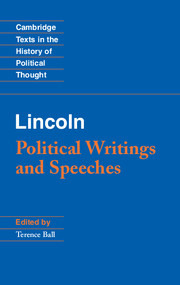Book contents
- Frontmatter
- Contents
- Preface
- Introduction
- Chronology
- Biographical synopses
- A note on sources and abbreviations
- Bibliographical note
- I Political Writings and Speeches
- 1 Autobiographical sketch
- 2 “The Perpetuation of Our Political Institutions”
- 3 Limits of Presidential Power
- 4 Speech on the Kansas–Nebraska Act
- 5 To Joshua F. Speed
- 6 Speech on the Dred Scott Decision
- 7 “A House Divided” Speech
- 8 Portion of a Speech at Edwardsville, Illinois
- 9 Seventh Lincoln–Douglas Debate
- 10 On Thomas Jefferson
- 11 Cooper Union Address
- 12 Speech at Indianapolis, Indiana
- 13 Speech at Independence Hall, Philadelphia, Pennsylvania
- 14 First Inaugural Address
- 15 Message to Congress in Special Session
- 16 Appeal to Border-State Representatives for Compensated Emancipation
- 17 Address on Colonization to a Committee of Colored Men
- 18 To Horace Greeley
- 19 Preliminary Emancipation Proclamation
- 20 Proclamation Suspending the Writ of Habeas Corpus
- 21 Second Annual Message to Congress
- 22 Final Emancipation Proclamation
- 23 To General John A. McClernand
- 24 To Erastus Corning and Others
- 25 To Matthew Birchard and Others
- 26 To James C. Conkling
- 27 The Gettysburg Address
- 28 Third Annual Message to Congress
- 29 Proclamation of Amnesty and Reconstruction
- 30 Reply to the New York Working-men’s Democratic Republican Association
- 31 To Albert G. Hodges
- 32 To Charles D. Robinson
- 33 Reply to a Southern Woman
- 34 “With Malice toward None”
- 35 Speech on Reconstruction
- II Notes and Fragments
- Index
30 - Reply to the New York Working-men’s Democratic Republican Association
Published online by Cambridge University Press: 05 April 2013
- Frontmatter
- Contents
- Preface
- Introduction
- Chronology
- Biographical synopses
- A note on sources and abbreviations
- Bibliographical note
- I Political Writings and Speeches
- 1 Autobiographical sketch
- 2 “The Perpetuation of Our Political Institutions”
- 3 Limits of Presidential Power
- 4 Speech on the Kansas–Nebraska Act
- 5 To Joshua F. Speed
- 6 Speech on the Dred Scott Decision
- 7 “A House Divided” Speech
- 8 Portion of a Speech at Edwardsville, Illinois
- 9 Seventh Lincoln–Douglas Debate
- 10 On Thomas Jefferson
- 11 Cooper Union Address
- 12 Speech at Indianapolis, Indiana
- 13 Speech at Independence Hall, Philadelphia, Pennsylvania
- 14 First Inaugural Address
- 15 Message to Congress in Special Session
- 16 Appeal to Border-State Representatives for Compensated Emancipation
- 17 Address on Colonization to a Committee of Colored Men
- 18 To Horace Greeley
- 19 Preliminary Emancipation Proclamation
- 20 Proclamation Suspending the Writ of Habeas Corpus
- 21 Second Annual Message to Congress
- 22 Final Emancipation Proclamation
- 23 To General John A. McClernand
- 24 To Erastus Corning and Others
- 25 To Matthew Birchard and Others
- 26 To James C. Conkling
- 27 The Gettysburg Address
- 28 Third Annual Message to Congress
- 29 Proclamation of Amnesty and Reconstruction
- 30 Reply to the New York Working-men’s Democratic Republican Association
- 31 To Albert G. Hodges
- 32 To Charles D. Robinson
- 33 Reply to a Southern Woman
- 34 “With Malice toward None”
- 35 Speech on Reconstruction
- II Notes and Fragments
- Index
Summary
This is Lincoln’s reply to a delegation of New York workingmen who had made him an honorary member of their organization, which rallied workingmen to the Union cause. Here Lincoln expounds his views on the value of labor (see also selections 45–7).
The honorary membership in your Association, as generously tendered, is gratefully accepted.
You comprehend, as your address shows, that the existing rebellion, means more, and tends to more, than the perpetuation of African Slavery – that it is, in fact, a war upon the rights of all working people. Partly to show that this view has not escaped my attention, and partly that I cannot better express myself, I read a passage from the Message to Congress in December 1861:
It continues to develop that the insurrection . . . till all of liberty shall be lost.
The views then expressed remain unchanged, nor have I much to add. None are so deeply interested to resist the present rebellion as the working people. Let them beware of prejudice, working division and hostility among themselves. The most notable feature of a disturbance in your city last summer, was the hanging of some working people by other working people. It should never be so. The strongest bond of human sympathy, outside of the family relation, should be one uniting all working people, of all nations, and tongues, and kindreds. Nor should this lead to a war upon property, or the owners of property. Property is the fruit of labor – property is desirable – is a positive good in the world. That some should be rich, shows that others may become rich, and hence is just encouragement to industry and enterprize. Let not him who is houseless pull down the house of another; but let him labor diligently and build one for himself, thus by example assuring that his own shall be safe from violence when built.
March 21, 1864
- Type
- Chapter
- Information
- LincolnPolitical Writings and Speeches, pp. 201 - 202Publisher: Cambridge University PressPrint publication year: 2012
- 1
- Cited by



